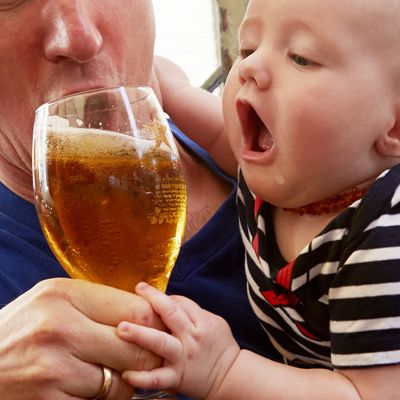
When I was pregnant with my son, the question I both hated the most and received most often was, “Are you going to breast-feed?” As if it were anyone’s business, my answer was always, “I’m going to try. If I can’t, I’m not going to feel bad about it.”
But after an emergency C-section following 30 hours of labor, all the good pain meds, and a daily antihistamine no one bothered to tell me I should stop taking, I had a lot of trouble breast-feeding. And guess what? I felt bad about it.
Unlike my milk, the mom guilt came fast and it came hard.
While feeding Theodore was, of course, the most important thing, with every ounce of supplemental formula I mixed, I felt my body was failing my baby. So, I started obsessively Googling galactagogues — any food or drug that can help increase a mother’s milk production. I spent more than I’d like to admit on lactation cookies, teas, pills, tinctures, and oils. I ate tons of oatmeal and drank way too much Gatorade. But my favorite supply booster was beer.
Most experts agree that when it comes to alcohol, if you can drive, you can breast-feed. And as someone who writes about spirits, enjoyed my wine without guilt during the second and third trimesters, and is married to a Certified Cicerone (basically a sommelier of beer), I was thrilled to learn that for centuries, women have been drinking beer in hopes of making more milk. In fact, before Prohibition, Anheuser-Busch produced a low-alcohol brew called Malt-Nutrine, billed as “a sparkling non-intoxicant” that was “a highly concentrated liquid extract of malt and hops.” It contained only 1.99 percent alcohol, and was prescribed for pregnant and lactating women.
With low-alcohol beer specifically brewed for breast-feeding moms nowhere to be found these days, recommendations for other types were all over the place but leaned heavily toward Guinness. It seemed to make sense — all that dark stuff had to be good for something, and as far as beers go, it has one of the lowest alcohol contents, coming in at 4.2 percent ABV. So, even though I don’t really like stouts, I quickly developed a taste for them, and every night I tried to enjoy a Guinness while little Theodore clearly got much more enjoyment from my right boob (his favorite, because apparently that’s a thing with babies).
Though he’s pro-beer, my husband is also against anything not prescribed by a modern-day medical practitioner and started asking around to see if there was any truth to this beer theory. His Belgian co-worker said that in Europe it’s common to give new moms a bottle of stout with their lunch while they’re still in the hospital. And our OBGYN friend told him she thought hoppy beer was supposed to do the trick.
That was enough to quell any concerns he might have had, but it got me thinking: If IPA was just as good as stout at boosting my supply, I’d much rather be drinking that.
It turns out that both the Belgian brewmaster and the OBGYN were right. And they were both wrong.
Malted barley is a necessary ingredient for all types of beer and, malted or not, barley has been shown to affect the secretion of prolactin — one of the two hormones responsible for milk production. Oxytocin, the “feel-good” hormone, is necessary for the letdown step of lactation, and it makes sense that having a drink can help a woman relax and increase her levels of oxytocin. (So can chocolate, orgasm, and yoga.) Hops, another ingredient present in all types of beer to varying degrees, are likely to have a relaxing effect as well.
Unfortunately, multiple studies have shown that having more than two drinks can inhibit letdown and for most women, even a small amount of alcohol can cause a temporary, but significant, decrease in milk supply. One study, Beer, Breast Feeding and Folklore (Mennella and Beauchamp, 1993), found that breast-fed infants consumed an average of 23 percent less milk after their mothers had just one alcoholic beer.
“This is actually one of my pet peeves,” said Sara Newman, an International Board Certified Lactation Consultant and postpartum doula in New York City, speaking of the tradition surrounding beer as a breast-milk booster. “Yes, some of the ingredients in beer are galactagogues, but the presence of alcohol suppresses milk production. So, any benefit moms are getting from the beer is counteracted by the amount of alcohol in the beer.”
“Even Guinness?” I asked. “It’s pretty low in alcohol.”
The problem with that thinking is that everyone metabolizes alcohol at a different rate, Newman told me. Weight, body-fat percentage, and whether or not a mother has eaten anything all play a part.
Luckily, the negative effects of moderate alcohol intake on breast milk are short-lived. Once “sober,” Newman said, supply levels go back to normal.
“I don’t generally recommend beer due to the alcohol component because there are so many other options,” said Jenny Walters, an International Board Certified Lactation Consultant and the Infant Feeding Coordinator at the University of Kansas Medical Center. “But if a mom tells me she is using it — safely, in moderation, and all that jazz — and it’s working for her, I’m certainly not going to recommend she stop. Feeding our babies (or being a mom in general) should not be so measured, calculated, and stringently rule-based that it excludes the ability to have a life.”
Even Newman is onboard with that.
“It’s fine if you want to have a beer at the end of the day,” she said. “You probably deserve one. But don’t think you’re doing it to increase your milk supply.”
I’ll still drink to that. But from now on, it will be an IPA.
The takeaway for other breast-feeding moms? Instead of forcing down a beer you might not like, enjoy a drink you do. Even if it’s a cocktail. Neither is necessarily going to boost your milk production, but nearly everyone can agree that as a new mom, you earned that drink.




